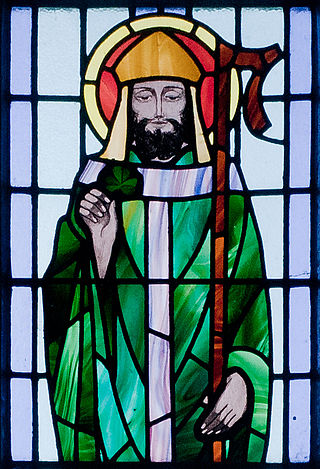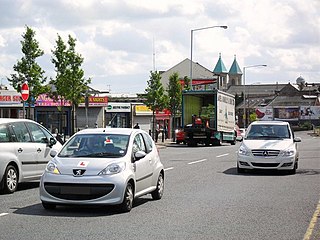Related Research Articles

Northern Ireland is a part of the United Kingdom in the north-east of the island of Ireland that is variously described as a country, province or region. Northern Ireland shares an open border to the south and west with the Republic of Ireland. At the 2021 census, its population was 1,903,100, making up around 3% of the UK's population and 27% of the population on the island of Ireland. The Northern Ireland Assembly, established by the Northern Ireland Act 1998, holds responsibility for a range of devolved policy matters, while other areas are reserved for the UK Government. The government of Northern Ireland cooperates with the government of Ireland in several areas under the terms of the Belfast Agreement. The Republic of Ireland also has a consultative role on non-devolved governmental matters through the British–Irish Governmental Conference (BIIG).

Ian Richard Kyle Paisley, Baron Bannside, was a Northern Irish loyalist politician and Protestant religious leader who served as leader of the Democratic Unionist Party (DUP) from 1971 to 2008 and First Minister of Northern Ireland from 2007 to 2008.

Saint Patrick's Day, or the Feast of Saint Patrick, is a religious and cultural holiday held on 17 March, the traditional death date of Saint Patrick, the foremost patron saint of Ireland.

The Democratic Unionist Party (DUP) is a unionist, loyalist, and national conservative political party in Northern Ireland. It was founded in 1971 during the Troubles by Ian Paisley, who led the party for the next 37 years. Currently led by Jeffrey Donaldson, it is the second largest party in the Northern Ireland Assembly, and is the fifth-largest party in the House of Commons of the United Kingdom. The party has been described as centre-right to right-wing and socially conservative, being anti-abortion and opposing same-sex marriage. The DUP sees itself as defending Britishness and Ulster Protestant culture against Irish nationalism and republicanism. It is also Eurosceptic and supported Brexit.

The Northern Ireland Assembly, often referred to by the metonym Stormont, is the devolved legislature of Northern Ireland. It has power to legislate in a wide range of areas that are not explicitly reserved to the Parliament of the United Kingdom, and to appoint the Northern Ireland Executive. It sits at Parliament Buildings at Stormont in Belfast.

Nigel Alexander Dodds, Baron Dodds of Duncairn,, is a British unionist politician who has been the Leader of the Democratic Unionist Party (DUP) in the House of Lords since 2021, and was the deputy leader of the DUP from 2008 to 2021.

John Miller Andrews, was the second prime minister of Northern Ireland from 1940 to 1943.
Anne Letitia Dickson CBE is a former Northern Ireland Unionist politician.
The Green Party Northern Ireland is a political party in Northern Ireland. Like many green political parties around the world, its origins lie in the anti-nuclear, labour and peace movements of the 1970s and early 1980s.

Ardoyne is a working class and mainly Catholic and Irish republican district in north Belfast, Northern Ireland. It gained notoriety due to the large number of incidents during The Troubles.

Brian Wilson is a Northern Irish politician who was a member of North Down Borough Council for 34 years (1981–2015). He retired when local government was reformed. During this time he served as an Alliance member, Green Party and Independent. He was the first Green Party Councillor to be elected in Northern Ireland in 2005. Wilson served as the Green Party Northern Ireland’s Member of the Northern Ireland Assembly (MLA) for North Down from 2007 to 2011, and was the party’s first elected representative in the Assembly. He agreed to serve as an MLA for a single term, and stood down to be replaced by his research assistant, Steven Agnew.

The Loyal Orange Institution, commonly known as the Orange Order, is an international Protestant fraternal order based in Northern Ireland and primarily associated with Ulster Protestants. It also has lodges in England, Scotland and the Republic of Ireland, as well as in parts of the Commonwealth of Nations and the United States. The Orange Order was founded by Ulster Protestants in County Armagh in 1795, during a period of Protestant–Catholic sectarian conflict, as a fraternity sworn to maintain the Protestant Ascendancy in Ireland. The all-island Grand Orange Lodge of Ireland was established in 1798. Its name is a tribute to the Dutch-born Protestant king William of Orange, who defeated Catholic king James II in the Williamite–Jacobite War (1689–1691). The Order is best known for its yearly marches, the biggest of which are held on or around 12 July, a public holiday in Northern Ireland.

Gerard Kelly is an Irish republican politician and former Provisional Irish Republican Army (IRA) volunteer who played a leading role in the negotiations that led to the Good Friday Agreement on 10 April 1998. He is currently a member of Sinn Féin's Ard Chomhairle and a Member of the Northern Ireland Assembly (MLA) for North Belfast.

The 2007 Northern Ireland Assembly election was held on Wednesday, 7 March 2007. It was the third election to take place since the devolved assembly was established in 1998. The election saw endorsement of the St Andrews Agreement and the two largest parties, the Democratic Unionist Party (DUP) and Sinn Féin, along with the Alliance Party, increase their support, with falls in support for the Ulster Unionist Party (UUP) and the Social Democratic and Labour Party (SDLP).
John Joseph Barry is an Irish academic, green political economist and former Green Party politician. He was a councillor on Ards and North Down Borough Council from May 2014 to March 2018.

The Drumcree conflict or Drumcree standoff is a dispute over yearly parades in the town of Portadown, Northern Ireland. The town is mainly Protestant and hosts numerous Protestant marches each summer, but has a significant Catholic minority. The Orange Order insists that it should be allowed to march its traditional route to and from Drumcree Church on the Sunday before the Twelfth of July. However, most of this route is through the mainly Catholic/Irish nationalist part of town. The residents, who see the march as sectarian, triumphalist and supremacist, have sought to ban it from their area. The Orangemen see this as an attack on their traditions; they had marched the route since 1807, when the area was mostly farmland.

The Good Friday Agreement (GFA), or Belfast Agreement, is a pair of agreements signed on 10 April 1998 that ended most of the violence of the Troubles, an ethno-nationalist conflict in Northern Ireland that had prevailed since the late 1960s. It was a major development in the Northern Ireland peace process of the 1990s. It is made up of the Multi-Party Agreement between most of Northern Ireland's political parties, and the British–Irish Agreement between the British and Irish governments. Northern Ireland's present devolved system of government is based on the agreement.

The 2016 Northern Ireland Assembly election was held on Thursday, 5 May 2016. It was the fifth election to take place since the devolved assembly was established in 1998. 1,281,595 individuals were registered to vote in the election. Turnout in the 2016 Assembly election was 703,744 (54.9%), a decline of less than one percentage point from the previous Assembly Election in 2011, but down 15 percentage points from the first election to the Assembly held in 1998.
The fourth Northern Ireland Assembly was the unicameral devolved legislature of Northern Ireland following the 2011 assembly election on 5 May 2011. This iteration of the elected Assembly convened for the first time on 12 May 2011 in Parliament Buildings in Stormont, and ran for a full term.
Kelly Andrews may refer to:
References
- ↑ Kelly Andrews - Co Chair - North Down Archived 2011-01-26 at the Wayback Machine , Green Party in Northern Ireland
- ↑ Commission Members Archived 2010-09-26 at the Wayback Machine , Parades Commission